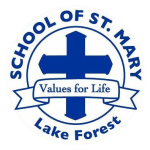Religion: Teachers provide activities that introduce the weekly Gospel. The class follows the liturgical year through prayer, Bible stories, prayer services, feast and Holy Day celebrations, as well as attendance at weekly Mass.
Formal sacramental preparation coincedes with the Church of St. Mary's ministry of Religious Education.
Textbooks: Saidler'sWe Believe, Supplemental periodical
| Reading & Language Arts: Students participate in large and small group reading, as well as individualized, guided instruction in a whole group, students explore the Wonders textbook. In small, leveled groups and individualized instruction, students develop early literacy skills by reading differentiated, guided reading text at their appropriate level.
Building strong phonetic and basic sight vocabulary are essential elements of the curriculum. Teachers rely on formal and informal assessments in addition to standardized benchmarking, for fluency and comprehension.
Textbooks: Reading Wonders, Accelerated Reader, iReady, Supplemental literature texts,
Heggerty Phonics
|
Writing/Handwriting: Formal handwriting and written expression instruction begins in kindergarten but continues throughout early elementary. Second graders learn the basics of cursive handwriting.
Students practice skills by completing workbooks, journals, book reports, and presentations to the class.
Textbooks: Wonders Reading/Writing Workshop, McGraw Hill Language Arts,
Sunform Motor Planning System (printing and cursive)
|
Mathematics: SOSM follows the Archdiocesan standards for math, which include sorting and classifying objects, identifying basic shapes, using rote counting, one-to-one correspondence to twenty, and skip counting, patterning, graphing, comparing, recognizing sets, measuring, telling time, using money, as well as adding and subtracting.
SOSM will supplement targeted instruction with iReady.
Textbooks: enVision Math, Freckle Math, iReady
|
Science: Teachers design lessons based upon the Amplify curriculum, which aligns with the Next Generation Science Standards (NGSS). This program blends hands-on and literacy-rich activities and interactive digital tools to empower students to think, read, write, and argue like real scientists and engineers. Field trips enhance the relevance of concepts in the real world.
Textbooks: Amplify Science, Scholastic magazines
|
Social Studies: Second graders enrich their understanding of their community, past and present, as well as communities around the world as they investigate themes based upon history, geography, economics, and civics. Teachers also create thematic units based on holidays, seasons, and current events.
Textbooks: Thematic units, Social Studies Alive, Scholastic magazines
|

